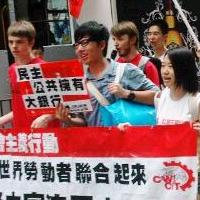
Socialist Action (CWI) campaigning against the capitalist 1% and against racism
Over 3,000 joined the International Labour Day march organised by the Hong Kong Confederation of Trade Unions (HKCTU) from Victoria Park to Government Headquarters. The organisers raised demands for a higher minimum wage, calling for an hourly rate of HK$33 and an 8-hour working day. In addition to HKCTU affiliates there were contingents from the Federation of Students, several pan-democratic parties and left groups. Largest of all were the contingents of migrant workers.
Socialist Action (CWI supporters in Hong Kong) took part in the demonstration with comrades from a variety of national backgrounds. Our main demands were for an increase in the minimum wage to HK$40 per hour, an end to discrimination of migrants, and against the capitalist “1%” with the slogan: “capitalism must go!”

The minimum wage was introduced in 2011 at the very low level of HK$28 per hour. The leaders of the HKCTU, like the pro-Beijing FTU, only demand an increase of the minimum wage to HK$33 an hour, when the level is reviewed in September. This does not even compensate for the effects of inflation and shows that time has ‘stood still’ as far as some union leaders are concerned. Whereas soaring prices have cut deep into workers’ real living standards.

To compensate for inflation in the period since it was set, the minimum wage would need to be raised to HK$35 per hour this year. This would only maintain its low initial level and not represent a real increase in the minimum, which is why Socialist Action puts forward the figure of HK$40 and calls for a mass unionisation campaign in low-pay sectors such as fast-food and retailing.
With sky-high housing and food costs, workers are forced to work excessive hours even those in ‘white collar’ sectors. One bank employee told the press that his two-year-old son did not recognise him and called him ‘uncle’ one day when he went home early. This worker regularly worked into the late evening. Average working hours in Hong Kong are at the same level today as in the US one hundred years ago!

Firefighters’ struggle
This year, in a new development, the firefighters also took to the streets to demand a 48-hour workweek. Over 1,500 off-duty firefighters joined their protest march, while many on-duty staff held protest meetings inside fire stations at the same time. The firefighters have been demanding a reduction in work hours from 54 to 48 per week, since 1990, and clearly a more militant mood is building up, with discussions of a work-to-rule and even strike action, although union representatives have ruled this out. Many firefighters are angry that the employers’ side tried to silence their station protests by banning the use of placards and banners outside the fire stations (they were permitted inside, where no members of the public would see them!).

Socialist Action was the only political organisation to join the firefighters’ demonstration and gave a short speech in support of their struggle. While union leaders seemed not to welcome this, it was well received by many ordinary firefighters.
Migrants
As in previous years the most vocal and visible part of the HKCTU demonstration, accounting for at least half the total, was the massed ranks of migrant women workers – Filipinas, Indonesians, Sri Lankans and Thais among other national groupings. A contingent of male Nepalese construction workers also stood out. There are over 300,000 migrant workers in Hong Kong performing many of the most menial and arduous jobs, that keep the wheels of the economy turning, but for very low levels of pay and long working hours.

The migrant participation on 1 May is a graphic illustration of the important role they can play in rebuilding a fighting labour movement in Hong Kong. The stronger working class traditions of struggle in many of these countries represents a ‘vitamin injection’ for the working class struggle in Hong Kong. It is therefore important that local workers’ organisations inscribe the struggle against discrimination and racism, and for working class unity, clearly on their banners and in formulating their demands such as for increases in the minimum wage. Unfortunately, there is a long way to go in spreading a basic understanding of this issue in the Hong Kong labour movement.
Workers’ unity
As Socialist Action pointed out in its Labour Day leaflet and speeches, the minimum wage law excludes migrants which is a scandal that all workers must fight against: “If we stand back while the government makes ‘second class citizens’ of any one group – migrants, women or young workers – this will be turned against all workers and used to undermine and defeat our movement.” [Socialist Action May Day leaflet]

The Hong Kong May Day demonstration showed the potential for internationalism, which the working class, more than any other social force is capable of harnessing. The struggle must be stepped up for fighting and democratic unions and a political instrument for the working class – a mass socialist party.

Be the first to comment